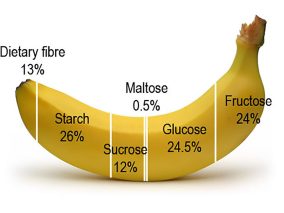If you’re a parent, you may feel like there’s a year long influx of candy. And if you’re trying to get your child to eat any sort of healthy, it’s that much harder when everyone (ehm, Grandmom) keeps giving them candy.
So, is sugar ever completely harmless? How much sugar is okay to eat?
Sugar naturally occurs in all kinds of whole foods. For example, here’s what the breakdown of sugars looks like in a banana. (All those compounds ending in “-ose” are sugars.)
But those sugars are not being discussed today. We’re only going to be discussing the added, refined sugars found in processed foods.

Added sugars—while it has its place in even the healthiest diets—doesn’t add a lot of nutrient value: No vitamins, minerals, phytonutrients, antioxidants, fiber, or water to speak of. And, it doesn’t make our bodies better, stronger, healthier, or more functional.
The 2020-2025 Dietary Guidelines for Americans recommends limiting added sugars to 10% of your intake. Given the above paragraph, that makes sense. (If you’re consuming 2000 calories per day, that’s approximately 200 calories from sugar, or 50 grams. For context, one packet of sugar contains about 4 grams of sugar, while one can of soda has just over 40 grams.)
The reason formal dietary guidelines suggest limiting your sugar intake isn’t because sugar is necessarily harmful on its own. Nor is it a direct cause of metabolic issues like diabetes, cardiovascular disease, or obesity.
It’s because if you eat too much refined sugar, you’re also likely eating less of the foods that actively contribute to your health and stave off nutrient deficiencies (like lean proteins, vegetables, fruits, legumes, whole grains, nuts, and more).
So, the problem isn’t so much the addition of sugar, but the displacement of more nutritious calorie sources.
Instead, most health issues are due to consistently eating more calories than you burn, whether because of overeating, under exercising, or both—not sugar specifically.
Should anyone avoid sugar? Sugar isn’t unequivocally “evil.” However, some people may still benefit from a lower-sugar diet because:
– They find that sugar feels “too good,” and almost has an addictive quality, making it hard for them to eat it in moderation.
– They’re more sensitive to carbohydrates, and feel like lower sugar diets help keep their energy and mood levels better regulated.
– They choose to prioritize more nutrient-rich foods for health reasons, and they also don’t feel deprived or miss sweet treats as much.
What we, at NIKA Athletics in Deland, FL, recommends: Notice your intake and how it makes you feel.
Sugar consumption isn’t likely a problem if your diet is mostly composed of whole foods. But if you tend to eat a lot of packaged foods, track your sugar intake (it’s listed on food labels) for 2-3 days and see where you land. For most people, rigidly cutting out sugar probably isn’t sustainable. Luckily, that’s not necessary.
And in case other parents are wondering: While many have long thought that too much sugar causes our kids to bounce off the walls, it turns out there’s no evidence to support that common belief either. In fact, a meta-analysis of 16 different studies on sugar and hyperactivity all came back with the same result: “Sugar does not affect the behavior or cognitive performance of children.”
How’s your sugar intake? Are you curious about it? Need help improving your nutrition overall? Let’s chat! Click here to schedule a Free Consultation.

